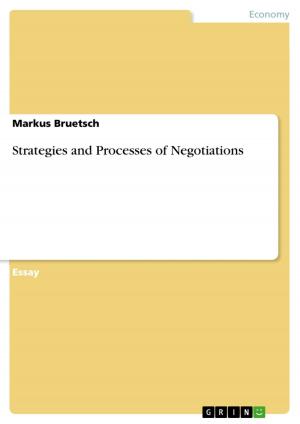First Europe-wide study on business profit in the Continuous Improvement Process (CIP)
Business & Finance, Management & Leadership, Management| Author: | Frank Alexander Reusch | ISBN: | 9783640472635 |
| Publisher: | GRIN Publishing | Publication: | November 16, 2009 |
| Imprint: | GRIN Publishing | Language: | English |
| Author: | Frank Alexander Reusch |
| ISBN: | 9783640472635 |
| Publisher: | GRIN Publishing |
| Publication: | November 16, 2009 |
| Imprint: | GRIN Publishing |
| Language: | English |
Scientific Study from the year 2009 in the subject Business economics - Business Management, Corporate Governance, European Initiative Continuous Improvement, language: English, abstract: 7,000 executives in the five largest European economies Germany, United Kingdom, France, Italy and Spain was asked about the business profit in the Continuous Improvement Process (CIP). There was the perception, likewise in the wake of the financial crisis, that organic growth strategies are gaining traction. This is of interest because efficient CIP is a crucial success factor in organic growth. For this reason, the aim of this Europe-wide study is to find out: - whether CIP is viewed by executives as a sensible long-term basis for profitable growth, - the present status of CIP implementation in the chief European economies, - what experience companies have gained with CIP, - whether investment in CIP is paying off, and - in which areas CIP can be usefully applied. An absolute majority of the respondents (62,8 %)spoke out in favour of CIP as a target-oriented tool. In this study, the dominant corporate strategy was chosen as a basis for differentiated statements. In fact, 69 % of the executives assess the importance of organic growth strategies as high or very high. By contrast, the significance of company acquisitions was rated high or very high by 42 %. This study can deliver an initial indication of the level of penetration in companies that is needed for CIP to generate the greatest possible benefit. The study has furnished evidence that an appreciable number of companies apply CIP and obtain considerable benefit from doing so. CIP offers an outstanding opportunity for further developing core competencies and improving performance in an entire company - unnoticed by competitors - and for sustainably defending such advances. The object of optimization is a whole enterprise - let the best show the way.
Scientific Study from the year 2009 in the subject Business economics - Business Management, Corporate Governance, European Initiative Continuous Improvement, language: English, abstract: 7,000 executives in the five largest European economies Germany, United Kingdom, France, Italy and Spain was asked about the business profit in the Continuous Improvement Process (CIP). There was the perception, likewise in the wake of the financial crisis, that organic growth strategies are gaining traction. This is of interest because efficient CIP is a crucial success factor in organic growth. For this reason, the aim of this Europe-wide study is to find out: - whether CIP is viewed by executives as a sensible long-term basis for profitable growth, - the present status of CIP implementation in the chief European economies, - what experience companies have gained with CIP, - whether investment in CIP is paying off, and - in which areas CIP can be usefully applied. An absolute majority of the respondents (62,8 %)spoke out in favour of CIP as a target-oriented tool. In this study, the dominant corporate strategy was chosen as a basis for differentiated statements. In fact, 69 % of the executives assess the importance of organic growth strategies as high or very high. By contrast, the significance of company acquisitions was rated high or very high by 42 %. This study can deliver an initial indication of the level of penetration in companies that is needed for CIP to generate the greatest possible benefit. The study has furnished evidence that an appreciable number of companies apply CIP and obtain considerable benefit from doing so. CIP offers an outstanding opportunity for further developing core competencies and improving performance in an entire company - unnoticed by competitors - and for sustainably defending such advances. The object of optimization is a whole enterprise - let the best show the way.















